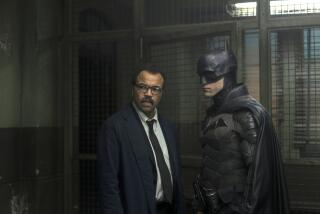Split Screen: Weighty Concerns vs. the Lightweight
- Share via
The crises continue.
These are grave times that television is chronicling as NATO continues air strikes against Serbs accused of engaging in ethnic cleansing against Albanians in Kosovo.
It was Monday. And like many before him, he was fleeing in a race against time, seeking sanctuary from those hoping to take away his freedom, his desperate exodus captured on TV as he moved from region to region just ahead of his armed pursuers. In the end, his efforts were futile, for finally they overtook and seized him, at gunpoint.
Another catastrophe from Kosovo? Nooooooh.
“Breaking News!” proclaimed the KNBC graphic on the screen.
Another car chase.
About 45 minutes’ worth on a day when shrunken Yugoslavia was again the tragic big story, as KNBC and KABC blew off most of their 5:30 p.m. and 6 p.m. newscasts to bring viewers live pictures of police cruisers on the tail of a man in a black sport-utility vehicle zigzagging through the eastern San Fernando Valley. KTTV and KCOP interrupted sitcom reruns to join the chase later.
Reports of genocidal atrocities in the Balkans remain horrifying. If only Los Angeles media cleansing were happening instead.
Not that KNBC and KABC hadn’t earlier aired their own Kosovo packages, only that there was something profoundly symbolic about them filling what remained of their news holes mostly with another meaningless police chase. Based on past performance, KCBS probably would have been there, too, had it not been carrying that evening’s CBS coverage of the NCAA men’s basketball championship.
This was quintessential local news in Los Angeles, with KTTV, KCOP and KABC choppers hovering fairly low when the cops, on foot with guns drawn, warily approached the reportedly armed driver inside the Jeep Cherokee. Thus, those stations were in good position to televise up close a possible shootout--which fortunately didn’t happen--despite the brutal lesson of last August when a fugitive motorist here halted his pickup on an overpass and killed himself with a shotgun on live TV.
This we witness. Yet how ironic that the darker, infinitely wider violence in the Balkans--the killing fields whose anguished cries are now resonating across Europe and the U.S., if not yet globally--are reaching us secondhand because of Western media having been either expelled or heavily censored by Serb authorities.
Instead of pictures of bloodshed, we have only testimony from fleeing survivors, many of them shown on TV Tuesday streaming from Kosovo, some walking, some crowded into vehicles of all types, some pulling elderly in wagons.
As always, though, TV’s forte is faces. And “on each face [was] the story of terror,” NBC’s Mike Lee reported Monday night about ethnic Albanian refugees flowing to neighboring regions in panoramic exoduses that appeared almost biblical in scope.
And evidence of terror on bodies, too.
“Look, the Serbs just shot me,” an old man said to an NBC reporter Tuesday morning while crossing into crowded Macedonia, raising his shirt to display a red splotch on his chest. “Please, leave me alone,” sobbed a distraught woman at the same bottle-necked border, where only a few were reported trickling across and thousands more were awaiting entry, with no Moses to part the Red Sea of humanity for them.
The previous evening, a displaced ethnic Albanian entering Macedonia told a CBS reporter, “The NATO planes are bombing the Serbs, and because they cannot do anything to the planes, they are killing the people in their houses.” Another man pleaded, as if the reporter were commanding a relief force: “You must hurry. You must stop the massacre. You must hurry. Please!”
Genocide Not Limited to One Continent
His words, and the desperation on his gaunt face, recalled a recent PBS “Frontline” program documenting inaction by the U.S. and other nations during the 1994 slaughter in Rwanda of an estimated 800,000 minority Tutsis by dominant Hutus. One indelible sequence showed Tutsis begging departing United Nations troops to shoot them so that they wouldn’t have to face a more painful death from Hutu machetes.
So as TV affirms, genocide and humanitarian crises are not limited to one continent, nor are ethnic Albanians the only casualties of the present round of violence set off in a region that has been combative for centuries. ABC’s “Nightline” Monday night interviewed U.S. crews of B-52 bombers that have been dropping their loads on Serbs, inevitably hitting innocent citizens along with military targets.
One pilot acknowledged that, from his perspective miles above the ground, those below were abstractions. “It weighs on your mind,” another airman said. “About the best you can do is just say a prayer for the people.”
Coincidentally, this is the week also in which ABC News launched its ambitious 12-hour documentary series “The Century,” covering a period that is ending more sourly than possibly anyone could have predicted.
ABC began by locating the seeds of the U.S. space program in Charles Lindbergh’s famed 1927 flight across the Atlantic, alone in the Spirit of St. Louis, a feat that made him an epic hero of the moment.
Anchor Peter Jennings poetically described Lindbergh’s small plane being “caught in a shaft of light,” and recalled the international euphoria that greeted the young aviator’s touchdown. “Here there was hope to be celebrated,” Jennings said.
Seventy-two years later, however, much of that hope has faded, and caught in TV lights and lenses are scene after scene of suffering. And in Los Angeles, of course, car chases.
More to Read
The complete guide to home viewing
Get Screen Gab for everything about the TV shows and streaming movies everyone’s talking about.
You may occasionally receive promotional content from the Los Angeles Times.






